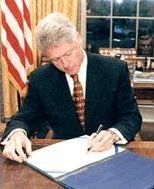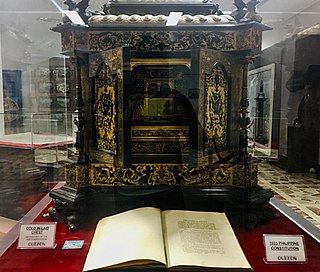Related Research Articles

Executive Order 9066 was a United States presidential executive order signed and issued during World War II by United States president Franklin D. Roosevelt on February 19, 1942. This order authorized the secretary of war to prescribe certain areas as military zones, clearing the way for the incarceration of Japanese Americans, German Americans, and Italian Americans in U.S. concentration camps. Notably, far more Americans of Asian descent were forcefully interned than Americans of European descent, both in total and as a share of relative population.

The Cabinet of the United States is a body consisting of the vice president of the United States and the heads of the executive branch's federal executive departments in the federal government of the United States, which is regarded as the principal advisory body to the president of the United States. The president is not formally a member of the Cabinet. The heads of departments, appointed by the president and confirmed by the Senate, are members of the Cabinet, and acting department heads also sit at Cabinet meetings whether or not they have been officially nominated for Senate confirmation. The president may designate heads of other agencies and non-Senate-confirmed members of the Executive Office of the President as Cabinet-level members of the Cabinet.
Independent agencies of the United States federal government are agencies that exist outside the federal executive departments and the Executive Office of the President. In a narrower sense, the term refers only to those independent agencies that, while considered part of the executive branch, have regulatory or rulemaking authority and are insulated from presidential control, usually because the president's power to dismiss the agency head or a member is limited.

An executive order is a means of issuing federal directives in the United States, used by the President of the United States, that manages operations of the federal government. The legal or constitutional basis for executive orders has multiple sources. Article Two of the United States Constitution gives the president broad executive and enforcement authority to use his or her discretion to determine how to enforce the law or to otherwise manage the resources and staff of the executive branch. The ability to make such orders is also based on expressed or implied Acts of Congress that delegate to the president some degree of discretionary power.
The United States order of precedence is an advisory document maintained by the Ceremonials Division of the Office of the Chief of Protocol of the United States which lists the ceremonial order, or relative preeminence, for domestic and foreign government officials at diplomatic, ceremonial, and social events within the United States and abroad. The list is used to mitigate miscommunication and embarrassment in diplomacy, and offer a distinct and concrete spectrum of preeminence for ceremonies. Often the document is used to advise diplomatic and ceremonial event planners on seating charts and order of introduction. Former presidents, vice presidents, first ladies, second ladies, and secretaries of state and retired Supreme Court justices are also included in the list.

The United States Intelligence Community (IC) is a group of separate United States government intelligence agencies and subordinate organizations, that work separately and together to conduct intelligence activities to support the foreign policy and national security of the United States. Member organizations of the IC include intelligence agencies, military intelligence, and civilian intelligence and analysis offices within federal executive departments.
In the United States, a Presidential Commission is a special task force ordained by the President to complete a specific, special investigation or research. They are often quasi-judicial in nature; that is, they include public or in-camera hearings.

The War Manpower Commission was a World War II agency of the United States Government charged with planning to balance the labor needs of agriculture, industry and the armed forces.
The President's Committee on Civil Rights was a United States Presidential Commission established by President Harry Truman in 1946. The committee was created by Executive Order 9808 on December 5, 1946 and instructed to investigate the status of civil rights in the country and propose measures to strengthen and protect them. After the committee submitted a report of its findings to President Truman, it disbanded in December 1947.

Established by President Dwight D. Eisenhower on 27 June 1957 by Executive Order 10717, the President's Award for Distinguished Federal Civilian Service was created to allow the President to recognize civilian officers or employees of the federal government who have made contributions "so outstanding that the officer or employee is deserving of greater public recognition than that which can be accorded by the head of the department or agency in which he is employed."

The President's Commission on Implementation of United States Space Exploration Policy was a Presidential Commission formed by United States President George W. Bush on January 27, 2004, through the Executive Order 13326. Its final report was submitted on June 4, 2004.
A commission is a formal document issued to appoint a named person to high office or as a commissioned officer in a territory's armed forces.
Executive Order 10925, signed by President John F. Kennedy on March 6, 1961, required government contractors to "take affirmative action to ensure that applicants are employed and that employees are treated during employment without regard to their race, creed, color, or national origin." It established the President's Committee on Equal Employment Opportunity (PCEEO), which was chaired by then Vice President Lyndon Johnson. Vice Chair and Secretary of Labor Arthur Goldberg was in charge of the Committee's operations. This first implementation of affirmative action was intended to give equal opportunities in the workforce to all U.S. citizens, not to give special treatment to those discriminated against.

Executive Order 13087 was signed by U.S. President Bill Clinton on May 28, 1998, amending Executive Order 11478 to prohibit discrimination based on sexual orientation in the competitive service of the federal civilian workforce. The order also applies to employees of the government of the District of Columbia, and the United States Postal Service. However, it does not apply to positions and agencies in the excepted service, such as the Central Intelligence Agency, National Security Agency, and the Federal Bureau of Investigation.

The U.S. Commission of Fine Arts (CFA) is an independent agency of the federal government of the United States, and was established in 1910. The CFA has review authority over the "design and aesthetics" of all construction within Washington, D.C. In accordance with the Old Georgetown Act, the CFA appoints the Old Georgetown Board. The Old Georgetown Board has design review authority over all semipublic and private structures within the boundaries of the Georgetown Historic District. The CFA was granted approval authority by the Shipstead-Luce Act over the design and height of public and private buildings which front or abut the grounds of the United States Capitol, the grounds of the White House, Pennsylvania Avenue NW extending from the Capitol to the White House, Lafayette Square, Rock Creek Park, the National Zoological Park, the Rock Creek and Potomac Parkway, Potomac Park, and the National Mall and its constituent parks.

The Constitution of the Philippines is the constitution or supreme law of the Republic of the Philippines. Its final draft was completed by the Constitutional Commission on October 12, 1986 and was ratified by a nationwide plebiscite on February 2, 1987.
The Knight Commission on the Information Needs of Communities in a Democracy is a group of 17 American media, policy and community leaders formed to assess the information needs of communities in the United States in the 21st Century, and recommend measures to help Americans better meet those needs. The John S. and James L. Knight Foundation funded the Commission and commissioned the Aspen Institute Communications and Society Program to run it. The co-chairs of the Knight Commission on the Information Needs of Communities in a Democracy are Theodore B. Olson, American lawyer and former Solicitor General of the United States, and Marissa Mayer, Vice President of Search Product and User Experience at Google. The Commission held its first public meeting in Washington, D.C. on June 24, 2008, and subsequent meetings or community forums in Aspen, Colorado; Chicago, Illinois; Missoula, Montana; Mountain View, California; Philadelphia, Pennsylvania; and Washington, D.C. The Knight Commission released its report, Informing Communities: Sustaining Democracy in the Digital Age on October 2, 2009.

The following is a timeline of the Presidency of Jimmy Carter, from January 1, 1980 to January 20, 1981.

The following is a timeline of the Presidency of Jimmy Carter from his inauguration as president of the United States on January 20, 1977, to December 31, 1977.
References
- ↑ Executive Order 13278 - From the Federal Reserve. URL accessed September 4, 2006.